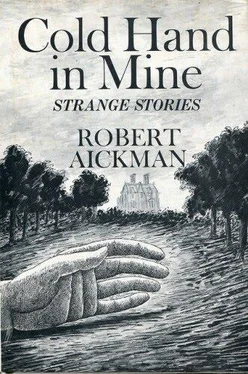Elmo realized that he was dead anyway. Elvira had killed him, life had killed him, the passing years had killed him: whichever it was. There was no need for a weapon, or for action of any kind on his part. When the heart is dead, all is dead, though the victim may not fully realize it for a long time. Elmo had realized when he had thrown away the pistol; and the Countess's action in contemptuously depriving him of any second chance was superfluous.
Elmo went to the Bodensee, because there seemed to be nowhere else where he could so easily be alone, indeed settle himself in a solitude. Before leaving Berlin, he had telegraphed the major-domo (in truth only a senior peasant, elevated, at the most, to caretaker) to arrange for the carriage to meet him at Stuttgart. He reached that other Schloss Allendorf by ten o'clock the next morning, feeling very hungry. Both with sleep and with appetite, unhappiness sometimes augments and sometimes destroys. It was eight years since he had been there.
For a year, he confined himself to the semi-ruinous buildings and to the neglected park stretching vaguely away behind them. He never once went down to the lake, lest he be observed. The park was at least walled, and it would have been a serious matter with the Hereditary Prince if the wall had been permitted to crumble at any point. Elmo never allowed as much as the light of a candle in any of his rooms unless the shutters had first been closed and the long, dusty curtains drawn tight. He gave orders that his arrival was to be mentioned nowhere, and that all letters (if there were to be any) were to be cast away unopened.
He read Thomas à Kempis and Jakob Böhme in copies from the castle library; of which the pages were spotted and flaky, and from which the leathery covers parted in his hands, revealing pallid, wormy activities within. Every now and then he inscribed thoughts of his own on the blank pages of an old folio. It was a book on magic. There were printed words and diagrams only in the first half of the volume. The remaining pages had been left blank for the purchaser or inheritor to add reports of his or her own, but no one seemed so far to have done so. Elmo found, as have many, that the death of the heart corrupted the pen into writing a farrago of horrors and insanities, not necessarily the less true for their seeming extravagance, but inaccessible for the most part to the prudent. Thus another autumn followed another summer, and then another cold, damp winter drew near.
Elmo discovered that even the imminence of spring, the worst quarter of the year for the sensitive, the period of most suicides, the season of greatest sadness, no longer disturbed him, or not that he was aware of. Before leaving, he had told them in Berlin that he was not to be approached: nor were such orders altogether unusual on the part of those in a position to give them. Autumn offered a faint respite.
Not that Elmo abstained from looking out over the lake from various upstairs windows. It seemed perfectly secure, provided that he took care to stand well back in the room; which was often, at that, an empty room as far as furniture or pictures or trophies were concerned. The panes in the windows were old and imperfect, not only defeating the intrusive stare from without, but also adding much to the fascination of the view across the water from within. Moreover, these upstairs windows were very imperfectly and infrequently cleaned. Sometimes Elmo would stand gazing and lost for hours at a time, oblivious at least; but in the end cramp and weariness would suddenly overcome him, in that it was, of course, impermissible to lean against the window frames themselves, as do most who look forth on life outside their abode.
"Jurgen!" Elmo went to the door of the big, empty room and shouted. He had expropriated all calendars, but supposed it to be now the end of September or the beginning of October: a phase of the twelvemonth when cold became noticeable. It was about eleven o'clock in the morning.
Jurgen, one of the resident peasants, came clambering up the several flights of imposing but uncarpeted stairs. Elmo had attached this man to his more personal needs, in the absence of the valet who had been his go-between or Mercury with Elvira, and who had therefore been left behind to rediscover himself in Berlin. The man was in late middle-age (or more), but had seemed sharper than his fellows.
"Jurgen. You see that boat?"
Jurgen looked through the discoloured window rather casually. "No, your Highness. I see no boat."
"Look again, man. Look harder. Look."
"Well, perhaps, your Highness."
"There's something I recognize about it. Something familiar."
Jurgen stared at his master, though only from the corner of his eye. He was not sure that he himself could see anything at all. However, his master's statement was all of a piece.
"Have you any ideas about it, Jurgen?"
"No, your Highness."
"I need to know. I should like the boat to be brought in, if necessary."
"That's not possible, your Highness."
"Why not? We've got Delphin and Haifisch, and men to row them. Or to sail them, if the wind's right."
"It's not that, your Highness."
"What is it, then?"
"If the boat your Highness speaks of out there is the boat I think I can see — though I'm not really sure about it, your Highness — she's not in territorial water."
"Not in our territorial water maybe, but I don't think we shall start a war."
Elmo, however, reflected for a moment. The Lake of Constance was adjoined by several different national territories, with varying statutes and rights. What did it really matter about the boat? What did it really matter about anything? What other thought mattered than that nothing mattered?
He was about to resign the pointless idea, as he had resigned other ideas, when Jurgen spoke again. "Your Highness, if the boat your Highness speaks of is where she seems to be, then, your Highness, she is on No Man's Water."
"What's that, Jurgen?"
"No Man's Water, your Highness, " Jurgen said again.
"I don't know what you mean, Jurgen."
Jurgen looked as if taken aback; so much so that he seemed unable to speak.
"You've lived here all your life," said Elmo, "and your father before you, and so forth. I haven't. In any case, I never came here for history and geography lessons. Explain what you mean."
"Well, your Highness, everyone knows — I beg your Highness's pardon — that there's a part of the lake which belongs to no one, no king or emperor, and not to Switzerland either, and from what I can see of it, if I can see it at all, that boat out there is on that very piece of water."
"I don't believe there's any such spot, Jurgen. I'm sure you think it, but it's impossible."
"As your Highness says," replied Jurgen.
Elmo was again looking out. "Can't you see something familiar about that boat?" It was true that, like most members of his family, he had exceptionally long sight, but he was staring as if distracted. He had even drawn far too near to the glass, though fortunately there seemed none to see him, as he would have been visible only from the lake; and on the lake, that cold morning, there was only the single boat in question, very distant, if there at all. Often there were odd fishermen, and odd traders too, but at the moment none were in sight.
"What is familiar about it, if I may venture to ask your Highness?"
"I wish I knew," said Elmo slowly. "I simply don't know. And yet I know I do."
"Yes, your Highness," replied Jurgen.
His master's words were still all of a piece. Downstairs most had come to the view that their master was simply a little out of his mind, poor gentleman. It was common enough among the great families; and elsewhere for that matter. He was always identifying things and recollecting things and staring at things.
Читать дальше












